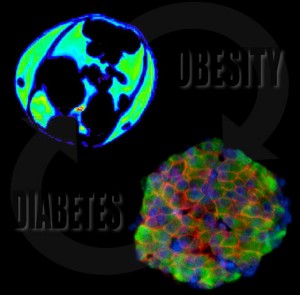The ‘Laboratory of Molecular and Cellular Medicine’ consists of students (graduate & undergraduate), technicians and postdoctoral fellows dedicated to developing novel and innovative therapeutic approaches for diabetes.
The ‘Laboratory of Molecular and Cellular Medicine’ consists of students (graduate & undergraduate), technicians and postdoctoral fellows dedicated to developing novel and innovative therapeutic approaches for diabetes. Our research typically involves sophisticated molecular techniques and studies at the cellular and physiological level. We believe that gene and cell based therapies may be the medicine of the future.
In 1923, Canadians Banting, Macleod, Best and Collip shared the Nobel Prize for their discovery of insulin. For millions of people around the world, this was a life-saving discovery. However, insulin is not a cure for diabetes. A diagnosis of type 1 diabetes still means thousands of insulin injections and blood glucose tests every year. Moreover, as it is virtually impossible to maintain optimal blood glucose levels by insulin injections, patients still suffer from several debilitating complications and reduced life-span.
Transplantation of pancreatic islets has proven to be effective in controlling blood glucose levels in subjects with type 1 diabetes. The results demonstrate the potential to treat diabetes by transplanting as little as a teaspoon of insulin-producing cells. However, this procedure is dependent upon obtaining tissue from recently deceased individuals and currently requires the use of chronic immunosuppression.
In our Laboratory we are investigating a variety of approaches to achieve the same result, without relying on tissue from donors. Ideally, we would like to develop a therapy that uses the patient’s own cells. While their insulin producing beta-cells may be absent or dysfunctional, it is possible that we may be able to stimulate sufficient numbers of beta-cells to grow back, or generate new beta-cells from stem cells. Alternatively we may be able to genetically modify other cells in the body to produce insulin or other anti-diabetic factors automatically in a meal-dependent manner. The ‘Laboratory of Molecular and Cellular Medicine’ consists of students (graduate & undergraduate), technicians and postdoctoral fellows dedicated to developing novel and innovative therapeutic approaches for diabetes. Our research typically involves sophisticated molecular techniques and studies at the cellular and physiological level. We believe that gene and cell based therapies may be the medicine of the future.
In 1923, Canadians Banting, Macleod, Best and Collip shared the Nobel Prize for their discovery of insulin. For millions of people around the world, this was a life-saving discovery. However, insulin is not a cure for diabetes. A diagnosis of type 1 diabetes still means thousands of insulin injections and blood glucose tests every year. Moreover, as it is virtually impossible to maintain optimal blood glucose levels by insulin injections, patients still suffer from several debilitating complications and reduced life-span.
Transplantation of pancreatic islets has proven to be effective in controlling blood glucose levels in subjects with type 1 diabetes. The results demonstrate the potential to treat diabetes by transplanting as little as a teaspoon of insulin-producing cells. However, this procedure is dependent upon obtaining tissue from recently deceased individuals and currently requires the use of chronic immunosuppression.
In our Laboratory we are investigating a variety of approaches to achieve the same result, without relying on tissue from donors. Ideally, we would like to develop a therapy that uses the patient’s own cells. While their insulin producing beta-cells may be absent or dysfunctional, it is possible that we may be able to stimulate sufficient numbers of beta-cells to grow back, or generate new beta-cells from stem cells. Alternatively we may be able to genetically modify other cells in the body to produce insulin or other anti-diabetic factors automatically in a meal-dependent manner.


